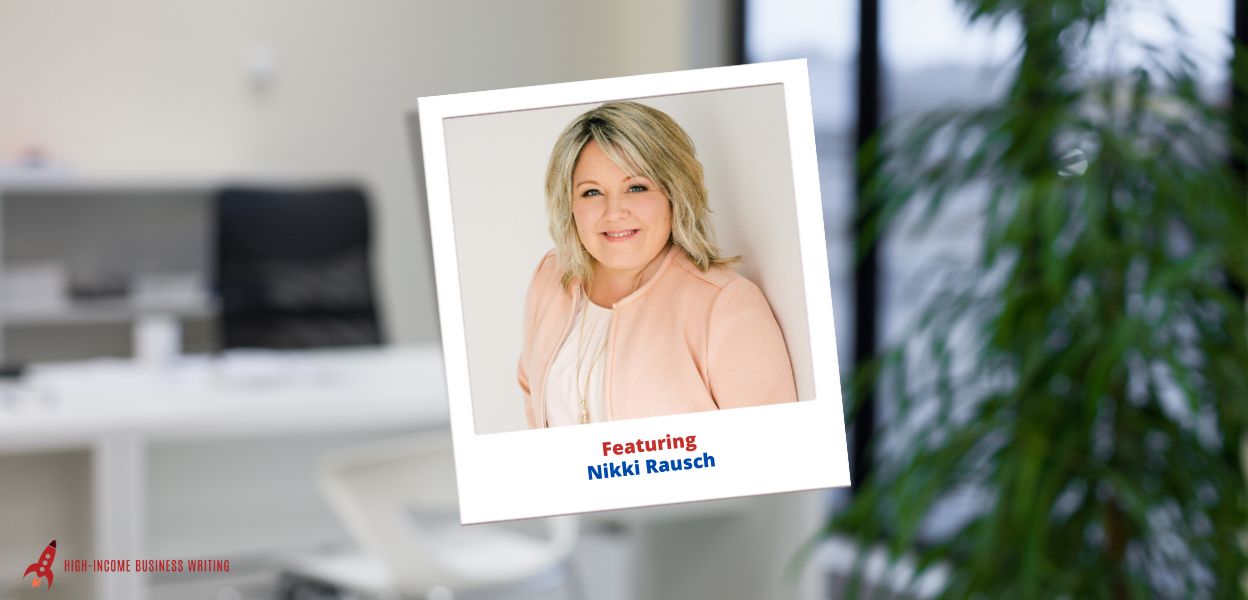The word “selling” or “sales” has very a negative connotation among writers. So much so that I often avoid using the word in my content.
Many of us associate selling with talking people into doing something they don’t want to do. High-pressure tactics. Used car salesmen. Telemarketers.
But that’s not selling at all. Selling is all about having a conversation. And when you start to really understand what selling is about and how to do it well, with integrity and without an agenda, your business will improve in a big way.
You’ll start landing more and better clients at higher fees. You’ll look forward to prospect conversations. And you’ll feel much more confident about your value and your ability to bring more of the right kind of business in the door.
My guest today will give a very different way to think about sales and selling. Her name is Nikki Rausch. Nikki is a selling coach and the CEO of Sales Maven. She has over 25 years of selling experience. And her specialty is helping entrepreneurs, small business owners and solo professionals sell successfully and authentically.
Nikki has written 3 books, which you can find on Amazon. And she’s the host of the Sales Maven podcast, in which she interviewed me recently to discuss how I break down and approach complex challenges. Check out that episode here. And check out my prior conversation with Nikki about the Selling Staircase.
In this interview, you’ll discover:
- Why most of us think about selling the wrong way
- A much healthier and authentic way to approach the selling process.
- How approach prospect conversations much more effectively and with greater confidence.
- And how to frame and pre-frame sales conversations so you can get the information you need faster (no more one-hour conversations!) while presenting yourself as the obvious choice.
Your Sales Maven
Closing the Sale
The notes that follow are a very basic, unedited summary of the show. There’s a lot more detail in the audio version. You can listen to the show using the audio player below. Or you can subscribe on Apple Podcasts, Spotify, Stitcher, Google Podcasts, Amazon Music or wherever you listen to podcasts.


High-Income Business Writing with Ed Gandia
#312: How to Land More of the Right Clients by Rethinking Your Selling Mindset and Process’
Key Topics and Bullets:
- Strategies to increase likelihood of hiring
- Consistency in content to reflect unique message
- Showcasing ideas and thought process to engage potential clients
- Asking specific questions about a client’s decision-making criteria
- Approaching client calls with curiosity
- Importance of silence in sales
- Utilizing open-ended questions and reframing “why” questions
- Scheduling circle back calls to avoid being ghosted
- Role of neurolinguistic programming (NLP) in communication and habits/patterns
- Reframing the perception of sales as being of service
- Importance of real conversations in the sales process
- Pre-framing and leading the conversation
- Balancing power in sales conversations
- Asking direct questions about decision-making process, decision makers, time frame, and budget
- Using the effective technique of “shutting up and waiting” for the prospect’s response
Timestamp Overview:
01:42 Ed– We’re gonna talk more about that. I’m curious about for those who are not familiar with, NLP, neuro linguistic programming. How does that factor first of all, what is it, and how does that factor into your work?
Nikki– So it’s really the study of communication. So neuro, is the way we process information in our brain, so that’s the neuro part of it. The linguistics part is language. So the how How do you speak? How do you speak to others? How do they speak to you? Picking up language patterns. And also, it also addresses any of that internal Dialogue that we’ve got going on in our head. Most of us got, you know, a voice or 2 or 3 going on in our head all the time. And then the the programming part is about habits and patterns. And so how I bring this into my work and NLP has been used.
04:02 Ed– So it’s not I think a lot of people I’ve talked to have this impression that it’s some kind of manipulation technique where where it’s really not. What I’m hearing from you, it’s really a better way to to to communicate more effectively.
Nikki– I think so. I mean, I, you know, like, like anything when you’re really, really good at it, you can use, You know, you can use whatever you’re really good at to be used for good or you can use it for bad. Right? So, I laugh because years ago, apparently, there was a book written that was called, how to use NLP to pick up chicks. Now that seems manipulative. But at the same time, you know, there’s guys out there trying to pick up chicks. So if you have a better strategy on how to do it. So, yes, it can be, I think, used in a manipulative way. In some of the techniques when I teach them, I specifically say, please use this with a high level of integrity because there is a power to what you’re doing.
07:39 Nikki– Your job in a sales conversation is to understand. Does this person have some type of a problem, a need, or a want? And do I have a solution that will meet that need or want? And am I interested in being of service to this other person? And if the answer is yes, they have a problem. Yes. I have a solution, and, yes, I’m interested in being of service to this person. Then I think you have an obligation to put that, whatever it is, product service in front of the other person and allow them to decide. Yes. I would like to buy that in this case, or No, that’s not the right fit for me. So that’s how I think about sales. It’s collaborative.
10:48 Nikki– But if somebody shows up in a conversation, they’re ready to have a sales conversation with you. If you preframe the start of that conversation, you kind of put everybody on the same page and you put everybody at ease, and it also shows a real respect for the other person. So an example of a pre frame, if you and I were gonna have a conversation, you’ve expressed some type of interest or you’re you know, you wanna find out a little bit more about what I do or who I serve or whatever, and we agree to have this conversation. The start of my conversation with you is the purpose of our call today, this is I’m gonna state the purpose. So the purpose of our call today is to chat a little bit more about what’s going on for you? And see if I have a solution that would meet whatever it is that you that you’re in need of right now. So that’s not a great way to say it, but that’s that’s a version of it. So state the purpose, say what the purpose is. K? So the purpose of it.
14:18 Ed– In your preamble, right, hey, the purpose of our call today is, do you ever say maybe this is, I think this is implied, but I like to say, and I don’t know if maybe I’ve been doing it the wrong way, is to see if if what your situation is, what your challenge is, and to see if I have a solution that could meet that. Right? But I always take the extra step and say, if It seems like we may have a match, then, you know, I can talk to you about how I can explain how I may be able to help you. And if we don’t, then I’ll let you know that as well. I kinda like to show them that, you know, it’s a or b, and I’m good with either one of them. Like, I don’t have an agenda other than trying to find out if we have a potential match. Do you go to that extent, or do you kinda leave that part out?
Nikki– So I don’t typically go to the extent of doing that, there’s no reason for you to not do it. Okay? So there’s I don’t have a I’m not saying, like, Ed, knock it off. Don’t do that anymore because of this or that. I think the fact that you’re doing it, it’s fine. It’s authentic to you. The one thing that I would be really careful about, and this isn’t specifically to you or how you phrased it. I would be a little, like, I wanna hear the way somebody’s phrasing it because sometimes we phrase things off, like it’s almost like we already start talking people out of hiring us. Like, you know, like, there’s a good chance you might not even need my service.
19:33 Ed– We’re looking for somebody to help us with it. So they have a specific project in mind that they’ve already identified. And then the other could be something one level beneath that, in that we’re we we really need to communicate this idea. We’re not really sure how and what format, You know, so something kind of in that category. They haven’t identified the solution yet, but they’re close to it, and they may even have some ideas. Should we do a, b, or c? But I would say that 80% of the time when you’re dealing with a more sophisticated client, they’ve identified the solution already. They’re looking for the right person, and they’re maybe open to taking a different approach. But so, you know, in those instances, I’m wondering if going with too high level of questions might feel a little bit detached.
Nikki– So here’s the example that you just gave about, we’re looking for a white paper to be written. We know we need it. The question I would ask is, one of my first questions would be, what is your criteria for determining who you’re gonna choose to write that white paper for you? What criteria will you be using? Because you need to know that. Because then when you make back your proposal, you need to use whatever answers they gave you to the criteria that needs to be a part of that proposal, whether it’s formal proposal that’s written that you’re sending back to them or whether it’s just part of the conversation. But I’m looking for key phrases that people are giving, and I’m looking for, like, how do I get to the heart of the matter of what’s the what’s the what’s gonna be the thing that tips them towards me if as long as I have a solution and I wanna work with them. Now the second example of, like, we’re just we know we wanna put this information out there, but we’re not really sure.
20:29 Nikki– I would probably ask some more specific questions. Like, what have you tried in the past to deliver information and what has been well received and what hasn’t from your audience? That kind of information, and maybe they know it and maybe they don’t, but I would ask a question like that. Because here’s the thing, If they don’t know it, if they don’t know the answer to that question, that’s an indicator that you’re paying attention to something they’re not even sure how to track. That also starts to set you apart as being credible, like, oh, here’s somebody who’s asking me a question about something that maybe I should be able to answer, and this person can probably help me determine that information. And I need to know that In order to put out effective con like, content. So you also again, these are those, like, you wanna ask questions that lead people down this path to hiring you.
24:50 Ed– I also like the fact that you’re approaching this call with real curiosity. You’re really trying to find it because it seems like you’re putting yourself at the same level instead of being subservient and treating it as an interview that goes both ways. Right? They’re interviewing you, but you’re interviewing them because you’re really trying to find out if there’s a match. That’s very different from approaching that with an agenda of, I need to close this deal.
Nikki– When you act in sales as if I’m just here to earn your business, I just want your business so bad, you are basically waiting for their parking space. Knock it off because they’ll feel it and they’ll take advantage. Now on the flip side, if you hold all the power in the conversation as the seller, and you treat or act as if the prospect should be subservient to you, they will oftentimes go and hire somebody else because we’re savvy as consumers, and we know that there’s other people out there that do what you do or do what I do, and you can find somebody else who’s a better fit for you. So even if they might buy something from you, they won’t become long term clients because they’ll feel like you’re always taking advantage of you. And so there should always be a balance of power. And the way you can balance power out in that conversation is, yes, you’re asking them the questions, but you give them the opportunity to answer. You don’t, you don’t talk over them.
28:11 Ed– Can you share some more questions in this category? Because I find that if you shy away from these questions, you’re not gonna have a real understanding of how they’re going about this and whether or not they’re gonna be a good fit, whether or not you’re wasting your time, and they seem confrontational, I think, to a lot of people. Right? So, maybe maybe, you know, maybe that’s my perception. But I try, I’m not afraid to ask these questions anymore. I used to be, but what kind of questions could you ask? With the understanding that, you know, we’re gonna link, by the way, to our previous episode where you went step by step through the selling staircase, which is extremely valuable, and I urge everyone to check it out.
Nikki– But there’s a way to frame that question so it lands really softly. So you don’t say so you don’t say, like, so who are the decision makers? And the reason you don’t say this is because if you just happen to be talking to somebody who’s an information gatherer and not a decision maker. They might feel a little pinched by you because they might be like, So you’re assuming that I’m not the decision maker? Or, like, you know, like, you’re talking down to them in some way. So the way you frame that question is you say, Now whom besides yourself is involved in the decision making? Because you assume, you presuppose that, of course they have influence in the decision. Otherwise, they wouldn’t be on a call with you. So they might say, oh, I don’t, I’m not involved in the decision. That’s okay.
32:50 Ed– Another one that I like to ask, I’m curious if you do this, and I usually do this in the prequalification typically in the, you know, in a form of, yeah. Is why did you reach out to me, or why did you decide to reach out to me specifically? Because I want to know what caught their eye and that’s just so powerful.
Nikki– So this comes from my background in NLP, so I’ll see if you like this or not, NLP is one of the one of the my favorite things I learned there was to rarely use why questions. Because and the reason I’m gonna share it is why it elicits a story and sometimes blame. So while can it be a time suck for people because they’ll need to tell you all the feeds and speeds and details as to why this happened this way. So it’s up to you. If you’re getting good answers, Keep asking that question. If you’re getting information on your intake form that fits for that, like, Ed, you know, you’re a master, so I’m not telling you to change. If it’s not getting you what you want, ask it as a what question instead of a why question. So what prompted you to reach out? You probably still get a lot of the same information, but you might not get as much.
35:45 Ed– And but it’s I never thought about reframing that question with a what. What made you reach out to me specifically? I wanna know, not your need, but why me? Because I will use their answer. It’s like, well, we love the fact you had the sales background, and then you came from, you know, the software industry and specifically construction software. Man, that is gold because then I know there are not too many others. Right? When I was, you know, writing for clients, there are not too many others who can fit the criteria they just mentioned.
Nikki– Yes. I love that. I mean, you should know what prompted somebody to be in touch with you. I’ll tell you the way that I, a lot of times, frame the question. I’m not saying it’s better. I’m just saying this is my version, I’ll say, How did we get connected? Because I like to imply we’re now connected. So how did we get connected? And so then people will know, they will still wanna share a little story like, oh, I’m a podcast listener. You know, my favorite is, I heard you on Ed’s podcast because I know you know this, but I love working with you like, you attract the best people.
39:09 Ed– But as we wrap up since we’ve been really talking about framing. We’ve been talking about framing the conversation you have with yourself, framing the conversation you have with prospects. How can we preframe so that when prospects do reach out to us, they’re way more likely to hire us? And I like to say, look, when people reach out to me, I want them to be about 70% sold on hiring me, not 30% sold. So what can we do ahead of time, proactively to get more people who reach out to us to be more on that side of the balance sheet more likely to hire us versus not knowing a thing?
Nikki– Well, some of that is, like, making sure that you’re putting content out into the market, that there’s a way for people to consume it, that you’re being that you are out there. So, you know, guesting on a podcast. Now not just guesting on a podcast, but make sure that your message, the things that make you unique, the things that make you stand out are the things that you’re talking about. You know, I could go on a lot, and I do guest on a lot of podcasts, and I can talk about a lot of things. But when somebody asked me to come on a podcast and talk about something other than sales, unless they’re a good friend and I’m just doing it to support them, the answer is no. Because, you know, make sure that the message that you’re putting out there is about what it is that you do so that when people do show up, they already feel like I mean, that’s why I love podcast because most of the time when people show up to have a, like, a discovery call with me, and if they’ve heard me on a podcast, they already get like, they get me. So they show up and they’re like, gosh, you sound just like how you sound on a podcast. You do the things that you talked about on the podcast.
41:45 Ed– So that when people find you, they’re gonna check you out first. I don’t care who you are, most people will check you out first. They’re gonna read your LinkedIn profile. They’re gonna go to your website. And the way I like to think of it, Nikki, is I want them to see how I think before they reach out. Because if I can show them how I think, it’s either gonna resonate with them and if they agree with my thinking and my thought process and the way I share ideas and ideas, then that’s a step in the right direction. You know? So because I’ve and if not, that’s fine too. I want my content to turn them off If it’s not a good prospect.
Nikki– Yeah. I’m so about I wanna attract my ideal clients. And, frankly, I wanna repel, like, seriously repel people who are not a good fit for my business. So somebody who doesn’t believe in the art of a sales conversation or somebody who doesn’t believe in building rapport, somebody who just wants to, like, talk at people, you know, and it’s all about convincing people. I want them to be so turned off by my message. Like, frankly, I want them to hate the sound of my voice because I don’t wanna spend any time having conversations with people who are like, I can’t stand you, or I don’t like your message. Like, I don’t need that in my mindset either. Right? So I wanna repel people as fast as possible and attract and so because I can repel people, and I do repel people.
47:09 Ed– I’m always learning and I’m learning from you. I got about 8 notes here, just from today’s conversation. So thank you
Nikki– Thank you for having me. I wanna reciprocate and say I learned so much from you too. The episode, you did a…you were so gracious and came on my podcast and let me do a mastering excellence episode with you where I got to dig into your philosophy and kind of mindset around, this idea of, like, how do you work through challenges and create a plan? So people are loving that episode, and you were so brilliant, and you shared so candidly. So thank you for that.
By the way… whenever you’re ready, here are 3 ways I can help you grow your freelance business:
1. Grab a free copy of my book.
It’s called Earn More in Less Time: The Proven Mindset, Strategies and Actions to Prosper as a Freelance Writer. The title says it all. 😉 — Click Here
2. Join my implementation program and be a case study.
I’m putting together a new implementation group this month. If you’re earning $5k+/month (or the part-time equivalent) from your freelance business … and you’d like to grow your income quickly with better clients … just email me at ed@b2blauncher.com
3. Work with me privately.
If you’re a 6-figure writer who’s trying to earn more in less time, with less stress, I might be able to help you get there faster than you think. Just email me at ed@b2blauncher.com and put “Breakthrough” in the subject line, and I’ll get back to you with more details.






